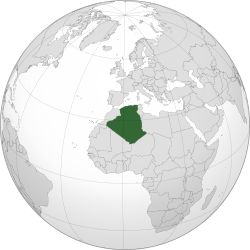Àlgéríà
Coordinates: 29°34′24″N 2°22′23″E / 29.5734571°N 2.3730469°E
Orílẹ̀-èdè Olómìnira Òṣèlú àwọn Ènìyàn ilẹ̀ Àlgéríà People's Democratic Republic of Algeria الجمهورية الجزائرية الديمقراطية الشعبية (Arabic) République algérienne démocratique et populaire (Faransé) | |
|---|---|
 Ibùdó ilẹ̀ Àlgéríà (dark green) | |
| Olùìlú àti ìlú tótóbijùlọ | Algiers 36°42′N 3°13′E / 36.700°N 3.217°E |
| Àwọn èdè ìṣẹ́ọba | Arabic • Berber |
| Other languages | French (administration, business and education)[3] Algerian Arabic (Darja) (lingua franca) |
| Àwọn ẹ̀yà ènìyàn |
|
| Ẹ̀sìn |
|
| Orúkọ aráàlú | Algerian |
| Ìjọba | Unitary semi-presidential constitutional republic |
| Abdelmadjid Tebboune | |
• Prime Minister | Nadir Larbaoui |
• Council Speaker | Salah Goudjil |
• Assembly Speaker | Slimane Chenine |
| Aṣòfin | Parliament |
• Ilé Aṣòfin Àgbà | Council of the Nation |
• Ilé Aṣòfin Kéreré | People's National Assembly |
| Formation | |
• Zayyanid dynasty | 1235 |
• Al Jazâ'ir | 1515 |
• French Occupation | 5 July 1830 |
• Independence from France | 3 July 1962 |
• Recognised | 5 July 1962 |
• Current constitution | 10 September 1963 |
| Ìtóbi | |
• Total | 2,381,741 km2 (919,595 sq mi) (10th) |
• Omi (%) | 1.1 |
| Alábùgbé | |
• 2020 estimate | 43,600,000[5] (32nd) |
• Ìdìmọ́ra | 17.7/km2 (45.8/sq mi) (168) |
| GDP (PPP) | 2019 estimate |
• Total | ▲ $684.649 billion[6] (35th) |
• Per capita | ▲ $15,765[6] (82nd) |
| GDP (nominal) | 2019 estimate |
• Total | ▲ $180.687 billion[6] (53rd) |
• Per capita | ▲ $4,229[6] (109th) |
| Gini (2011) | 27.6[7][8] low |
| HDI (2018) | ▲ 0.759[9] high · 82nd |
| Owóníná | Dinar (DZD) |
| Ibi àkókò | UTC+1 (CET) |
| Irú ọjọ́ọdún | dd/mm/yyyy |
| Ojúọ̀nà ọkọ́ | right |
| Àmì tẹlifóònù | +213 |
| ISO 3166 code | DZ |
| Internet TLD | .dz الجزائر. |
Àlgéríà (Arabiki: الجزائر, al-Gazā’ir), fun onibise Orílẹ̀-èdè Olómìnira Òṣèlú àwọn Ènìyàn ilẹ̀ Àlgéríà, je orile-ede ni Àríwá Áfríkà. Ile re ni ti orile-ede ti o tobijulo ni Okun Mediterraneani, ekeji totobijulo ni orile Áfríkà[10] leyin Sudan, ati ikokanla totobijulo lagbaye.[11]
Àlgéríà i bode ni ariwailaorun mo pelu Tùnísíà, ni ilaorun pelu Libya, ni iwoorun pelu Moroko, ni guusuiwoorun pelu Apaiwoorun Sahara, Mauritania, ati Mali, ni guusuilaorun pelu Niger, ati ni ariwa pelu Okun Mediterraneani Sea. Titobi re fe je 2,400,000 square kilometres (930,000 sq mi), be si ni iye awon eniyan re je 35,700,000 ni January 2010.[12] The capital of Algeria is Algiers.
Àlgéríà je omo egbe Iparapo awon Orile-ede, Isokan Afrika, ati OPEC. Bakanna o tun kopa ninu dida ikoenu owo Isokan Maghreb.

|
Àyọkà yìí tàbí apá rẹ̀ únfẹ́ àtúnṣe sí. Ẹ le fẹ̀ jù báyìí lọ tàbí kí ẹ ṣàtúnṣe rẹ̀ lọ́nà tí yíò mu kúnrẹ́rẹ́. Ẹ ran Wikipedia lọ́wọ́ láti fẹ̀ẹ́ jù báyìí lọ. |
Akiyesi
Itokasi
- ↑ "Constitution of Algeria, Art. 11". El-mouradia.dz. language: France and Arabic (government language); people of Algeria speak Arabic and Berber. Archived from the original on 18 July 2012. Retrieved 17 January 2013. Unknown parameter
|url-status=ignored (help) - ↑ "Constitution of Algeria; Art. 11". Apn-dz.org. 28 November 1996. Archived from the original on 25 July 2013. Retrieved 17 January 2013. Unknown parameter
|url-status=ignored (help) - ↑ 3.0 3.1 3.2 "The World Factbook – Algeria". Central Intelligence Agency. 4 December 2013. Archived from the original on 12 June 2007. Retrieved 24 December 2013. Unknown parameter
|url-status=ignored (help) - ↑ "Central Intelligence Agency". The World Factbook. Central Intelligence Agency. 8 February 2020. Archived from the original on 10 November 2016. Retrieved 23 February 2020.
- ↑ "Démographie" [Demography]. Office National des Statistiques (in French). 18 May 2020. Archived from the original on 6 March 2012. Retrieved 25 January 2020. Unknown parameter
|url-status=ignored (help) - ↑ 6.0 6.1 6.2 6.3 "World Economic Outlook Database". IMF.org. International Monetary Fund. Retrieved 24 February 2019.
- ↑ Staff. "Distribution of Family Income – Gini Index". The World Factbook. Central Intelligence Agency. Archived from the original on 13 June 2007. Retrieved 1 September 2009. Unknown parameter
|url-status=ignored (help) - ↑ "GINI index (World Bank estimate)". data.worldbank.org. World Bank. Archived from the original on 18 November 2018. Retrieved 24 February 2019. Unknown parameter
|url-status=ignored (help) - ↑ "Human Development Report 2019" (PDF) (in Èdè Gẹ̀ẹ́sì). United Nations Development Programme. 10 December 2019. Retrieved 10 December 2019.
- ↑ "Africa: Algeria". CIA World Factbook. Cia.gov. Archived from the original on 2016-11-10. Retrieved 2009-12-07.
- ↑ Encarta MSN
- ↑ "Population et Démographie". Office National des Statistiques. Retrieved 2010-03-13.
Preview of references
- ↑ The CIA World Factbook states that about 15% of Algerians, a minority, identify as Berber even though many Algerians have Berber origins. The Factbook explains that of the approximately 15% who identify as Berber, most live in the Kabylie region, more closely identify with Berber heritage instead of Arab heritage, and are Muslim.

